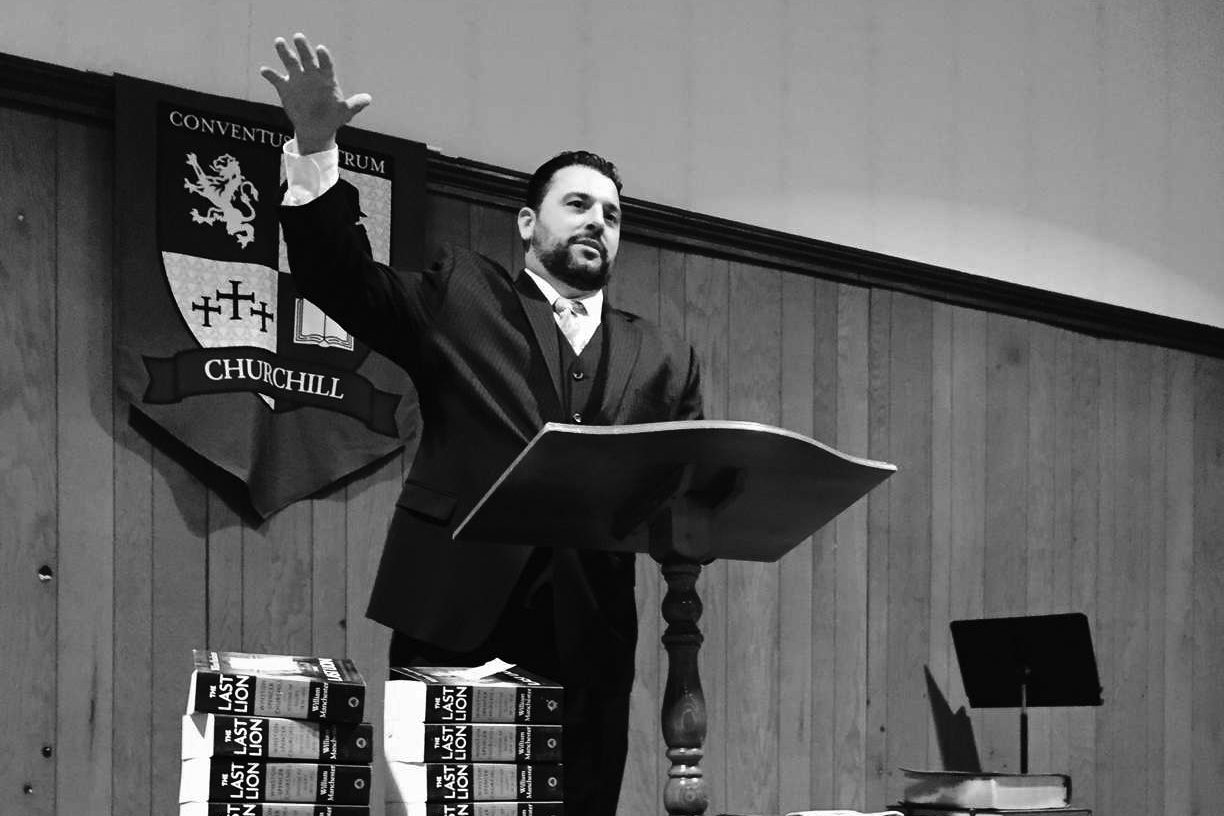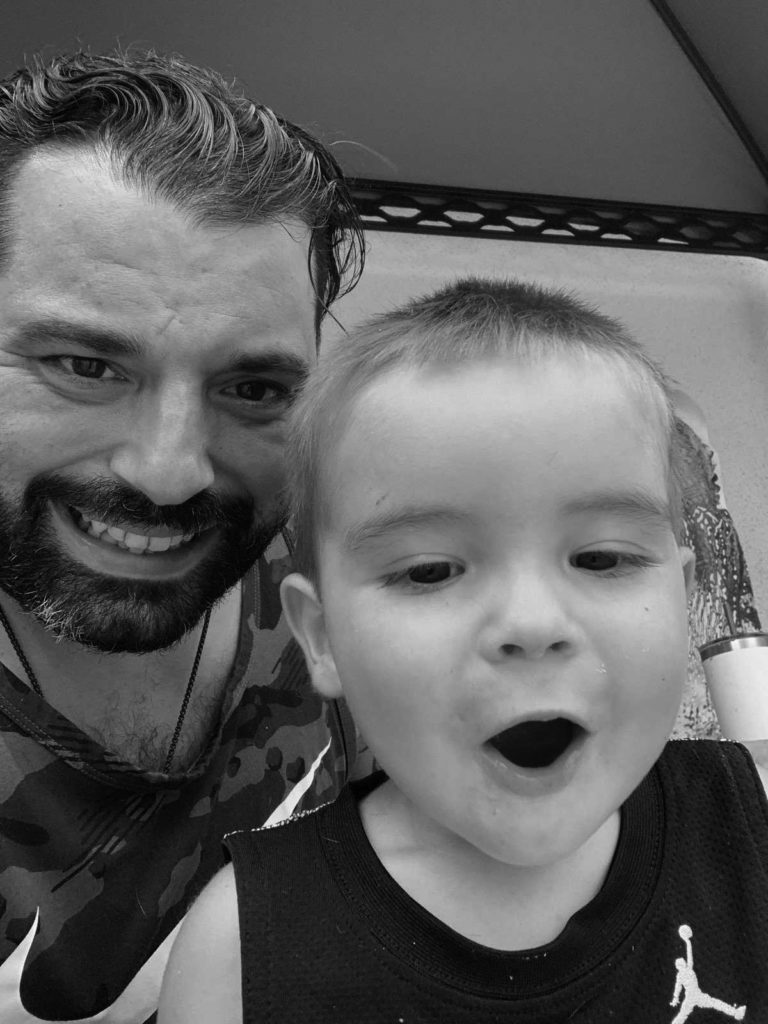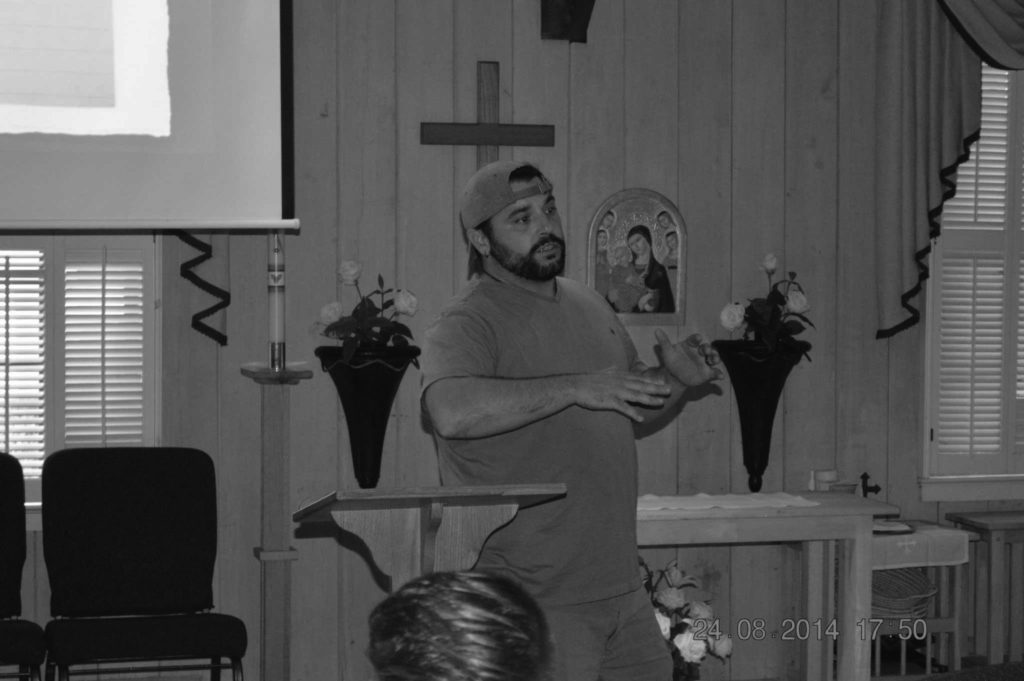Grace Like Breath
Chris Pasquale spent early adulthood without ambition and imprisoned by drug addiction. When a tragic incident forced a change, he found a new love for teaching and philosophy that he now uses to minister to others.

It was November 2007, and Chris Pasquale (PPE ’06) was sitting at his desk in Rutherford, N.J., organizing and filing his notes. He’d just finished presenting to the board of The Williams Center, a non-profit arts center in Rutherford, where he worked as Program Director for the cinema and live theater.
He paused as a passing board member greeted him at his desk. “Chris, your presentation about your role here was excellent,” she said. “I have an open position on my sales team at Chase Bank, and I think you could be a great fit. If you’re interested in applying, please let me know.”
A few weeks and one phone interview later, Pasquale stood in an alley outside The Williams Center theater listening to the Chase hiring manager explain salary and benefits. The scent of vegetable oil and chicken from a nearby restaurant mixed with the smell of theater popcorn. “Compensation for this role is $80,000 a year,” the hiring manager explained, “plus commission and benefits.”
Pasquale headed home that evening feeling ecstatic. Five years ago, this was the last palace he thought he would find himself. He had spent his high school years and early adulthood with an on-again, off-again relationship with drugs, often wanting to quit, but always failing to pull it off. When his brother Daniel died from a drug-related incident, and his best friend offered him a friendship that didn’t revolve around drugs, he was finally able to change course. Since then, he had managed to rebuild his life. While finding short-term jobs had always been easy for him, this was his first chance to launch a steady career. The choice to accept Chase’s offer seemed obvious, but something gave him pause.
Pasquale’s introduction to drugs started when he was 13, during a family vacation in Florida. Daniel borrowed some of his pocket money without saying what it was for and came back with marijuana. Pasquale decided to try some. Nothing bad happened; at the time, he felt great.
Better than the feelings though, were the friendships. In high school, an older friend, Drew, introduced Pasquale to harder drugs like heroin and crack. In both this friendship and his relationship with his brother, drugs served as an easy way to have a good time together. Pasquale also made sure his parents never saw anything worrisome: he played sports, had a job, and came home every night.
After they finished high school, Chris and Daniel began visiting a methadone clinic in the nearby town of Clifton, N.J. Methadone allowed them to maintain jobs despite their ongoing drug use. Men would line up outside the three story red brick building at 6:00 AM every day, most of them in their thirties and forties. Some would nod and smile, saying they were proud of them for working to overcome his addiction at a young age, not realizing the boys were using the methadone to hide their habits from their parents and employers. After picking up their prescriptions, the brothers would drive to Bagel Bistro in North Arlington, N.J., where Pasquale would order his favorite: sausage, egg, and cheese on an everything bagel.
Deep down inside, he wanted to quit. His lifestyle wasn’t working. At six different jobs, he had started out with high expectations and been promoted quickly. But the drug use would always catch up with him. He’d lose the position and start all over again at the next place. He’d never seriously considered college, instead hoping to achieve a steady career with hard work and charisma. But his dependence on opioids stunted that dream. When Daniel was out of town, he would stop using drugs, only to relapse when his brother returned home.
One cold January morning, Pasquale heard his father Stephen screaming his name from below the staircase outside his bedroom. “Chris!” Stephen shouted, “Your brother hung himself!” He leapt up, crossed the hallway to Daniel’s room, and hurled the door wide to find an empty bed. The clock read 1:21 AM. Pasquale clattered down the steps toward the back door. His father had found Daniel unconscious in the garage. It looked as though Daniel had fallen asleep with a rope around his neck. Pasquale believes that he did not ultimately intend to take his own life.
Stephen performed CPR in the frozen grass while Pasquale shouted at the 911 dispatcher on the phone. The ambulance arrived quickly. Standing there, barefoot and shirtless, Pasquale shivered as he watched the EMTs begin CPR a second time. Staring at his brother through the red and white glare of the ambulance lights, he knew Daniel was already gone.
Ten minutes later, Pasquale sat at the kitchen table in shock, wondering why he’d lived and his brother hadn’t. Their last conversation, just ten hours earlier, had ended with a dispute over a small sum of inequitably shared crack. “Everything,” he said to himself, “is going to change.”
In the morning hours that followed, several friends called, offering to help him get high to forget the experience. Pasquale didn’t want their offer, but it lingered in his mind.
Then another call came. It was Drew, the friend from high school who had introduced him to hard drugs. The two had lost touch two years before, when Drew had stopped partying, quit heroin and crack, gotten a job at IBM, and started attending church again. “Don’t go anywhere,” he told Pasquale, “I’m coming over.” Twenty minutes later, Drew was at his house. They spent the rest of the day together, talking for hours about what Pasquale’s next steps would be.
The next day, Pasquale told his dad he was going to quit cold turkey. “I’m also going to stop using methadone in four weeks,” he said. His dad was incredulous. “Chris, you can’t do that,” he said, “You’re gonna get sick. You’ll feel terrible.” Even the methadone clinic worker cautioned him that it wasn’t safe, but he was undeterred. “A lot of people commit to change and then fail,” recalls Stephen. “But Chris dove headfirst into quitting drugs. He was on a mission to turn everything around in his life.”
Two weeks after his last dose of methadone, Pasquale sat watching a movie at a local cinema when feverish chills and nausea crept over his body—the withdrawal symptoms everyone had warned him about. Fighting the sickness welling up inside, he closed his eyes and prayed. A few minutes later, he fell asleep. When he awoke, the movie had ended. The sickness was gone too, and it would
never return.
In the following weeks, Pasquale began a relentless pursuit of the plans and opportunities that he’d casually discussed with his dad in the years after high school. He started applying to colleges and filling out applications for financial aid. His application to The King’s College included a handwritten essay explaining how his life had changed. The day after his brother passed away, Pasquale had also called Gerard DeMatteo, a music teacher at Northeastern Bible College who had taught him Sunday school as a child. They’d known each other since Pasquale was eight years old. He asked to meet with DeMatteo for mentoring every week.
Meeting with DeMatteo helped Pasquale break through his broken spiritual paradigm. As a teenager and young adult, Pasquale measured his worth on a “cosmic justice scale,” believing that salvation required his good deeds to outweigh his bad ones. He believed his moral failings hopelessly outweighed his good works, and that he would never be good enough. In meeting after meeting, DeMatteo explained that the way to salvation wasn’t through good deeds measuring up on a scale. Pasquale began to see Jesus as his true propitiation, and that the heavy mass of sin condemning him is forever gone. Grace, he realized, was completely unearned.
While absorbing these truths, he and DeMatteo read Dallas Willard’s Renovation of the Heart. There Pasquale found his theme for life. “The greatest saints are not those who need less grace,” Willard writes, “but those who consume the most grace, who indeed are most in need of grace—those who are saturated by grace in every dimension of their being. Grace to them is like breath.”
In August, Pasquale was nearing the end of his shift at a local print shop across the street from his house when his dad called. He’d received a letter from The King’s College. Pasquale ran home and opened it on the steps outside his house, facing the street. His handwritten application letter had gotten him accepted to King’s, and with scholarships and financial aid, his tuition would be only $1,000 a year.
During his first semester at King’s, Pasquale worked harder than he had ever worked at school. He also became involved with designing the House system, as both the first president of the House of Churchill and as a student worker for David Leedy in student development.
“David always shot straight with me,” Pasquale says. “He helped me understand my strengths and weaknesses.” When Pasquale snubbed every idea offered when students were framing the House system, Leedy challenged him to provide solutions. Through his mentoring, Pasquale gained a clearer self-perception and became more constructive. “The work in counseling that I’m able to do now is in many ways because of David’s mentorship,” Pasquale says.
Pasquale graduated with an associate’s degree in PPE in May, 2005. He stayed at King’s for another year, intending to graduate with a bachelor’s, but the same year decided to start a youth group at Rutherford Bible Chapel near his home in New Jersey. In 2006, he transferred to Felician University to shorten his commute and work full-time as a youth pastor.
It was through youth ministry that Pasquale discovered a new passion for guiding and mentoring others, but he wasn’t sure he wanted to stay there long-term. He aspired to go on to full-time non-profit work or become a teacher.
The offer from Chase was a surprise turn of events and Pasquale was eager to begin his career in finance. But several weeks after the call with Chase, in November 2007, his phone rang again. The caller was from Community Education Centers (CEC), an organization that Pasquale had applied to over the summer while completing his last year at Felician. Now that he was ready to graduate, they had a role for him. “You’d be working with the inmates of a local jail,” they explained. “It pays $30,000 a year.”
For many people, the choice between two careers with a $50,000 pay gap would be simple. But Pasquale was only sure of one thing: he needed to call his dad for advice. “If you choose a career based on money,” his father said, “You may have money, but not satisfaction. If you choose a career based on fulfillment, the money
will come.”
When their conversation ended, Pasquale immediately called Chase and turned down the offer. Less than a year into his work at CEC, Pasquale was promoted twice and was supervising the counseling program for a large section of the jail. He regularly lectured on Rational Emotive Behavioral Therapy to 180 inmates.
“I used my education in philosophy and literature to help people ask the deep questions about existence,” Pasquale says. “Questions such as, ‘Who am I? Where am I going? And how am I going to get there?’ I mixed in reason and logic, forcing them to be honest with their current situations and to develop a plan that is consistent with that reality.”
In one lecture, drawing from Plato’s allegory of the cave, Pasquale explained to the inmates how their physical prison was in part a result of mental captivity. They could find freedom, he explained, by seeking truth. As Pasquale spoke, he watched their faces soften, and many of them began to weep, begging to be set free.
That moment was pivotal for Pasquale and he continued his work at CEC for two years. In 2010, he moved to Delray Beach, Fla., to start a new counseling job at The Delray Recovery Center. At his new job, Pasquale met David Niknafs, a coworker who quickly became his close friend.
Two years later in 2012, Niknafs founded RECO Intensive, a specialized addiction treatment program, wanting to help people overcome substance abuse by finding meaning and purpose in their life. In 2013, Pasquale became the Director of Operations at RECO, designing a clinical treatment program from scratch, managing staff members, and meeting with clients. At RECO, Pasquale continues what he had left behind at CEC, helping people wade through their traumas, insecurities, and fears to identify the next steps for inner healing.
He doesn’t regret his decision to turn down that Chase offer for a minute. Reflecting back to that moment in the prison where he watched the inmates confess their need for inner liberation, he discovered his love for using philosophy to free people from trauma and fear and realized what he wanted to do with his life. “I had a passion for helping people and a passion for teaching,” he recalls. “I felt I could do some good in the world.”






